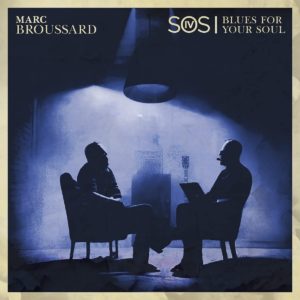With a portion of the proceeds from each of Marc Broussard’s S.O.S. philanthropic album series benefitting a different nonprofit, his latest installment targets Keeping the Blues Alive Foundation, which “fuels the passion for music by funding national relief grants and music education programs for students and teachers.” Keeping the Blues Alive Foundation’s founder is none other than blues-reining superstar Joe Bonamassa, who co-produced Blues For Your Soul and contributed his searing guitar on four cuts. Yet, it’s not another Bonamassa-flavored record. It’s Broussard’s inaugural blues plunge with deep cuts from guitar icons Howlin’ Wolf, B.B. King, and John Lee Hooker; and legendary vocalists Bobby “Blue” Bland, Little Milton, and Al Green.
With a stacked line-up including co-producer and guitarist Josh Smith, keyboardist Reese Wynans, and Soulive’s Eric Krasno, it’s the best of both worlds: Broussard’s commanding soul pipes and torching soloists keeping the groove rolling.
If it’s the latter that resonates with the listener, then there’s plenty to appreciate in the arrangements. Son House’s “Empire State Express,” originally acoustically rendered, sports a jarring, bombastic, out-of-control intro. Little Milton’s “That’s What Love Will Make You Do” provides a slippery, funky foundation for Broussard’s swaggering vocals reminiscent of Buckwheat Zydeco. Fueled by Dennis Gruenling’s blistering harmonica howling, Marc Broussard channels Howlin’ Wolf’s gruff vocals on “I Asked for Water.” Smith’s playing on Hooker’s “Locked Up in Jail (Prison Blues)” deviates from the predominant muscular sound with trancelike passages and a dangling, suspenseful ambiance.
While most of the guests reside outside the Pelican State, Broussard made the excellent decision to include Acadiana’s Roddie Romero. Among the bigger-name guitarists, Romero holds his own with his riveting, gutbucket playing on “Cuttin’ In.” Lyrically, it’s the album’s most vivid storyline: a guy breaking up a dance to patch things up with his girlfriend.
All this sets the stage for Broussard’s authentic, soul-drenched pipes. They’re the kind that comes around once every generation, a throwback to the killer R&B-soul crooners of the ’60s and ’70s. Comparisons to Bobby Womack aren’t that farfetched, and even though that era is now a gone pecan, Broussard couldn’t have captured it any better. This is the path he should stay on.



